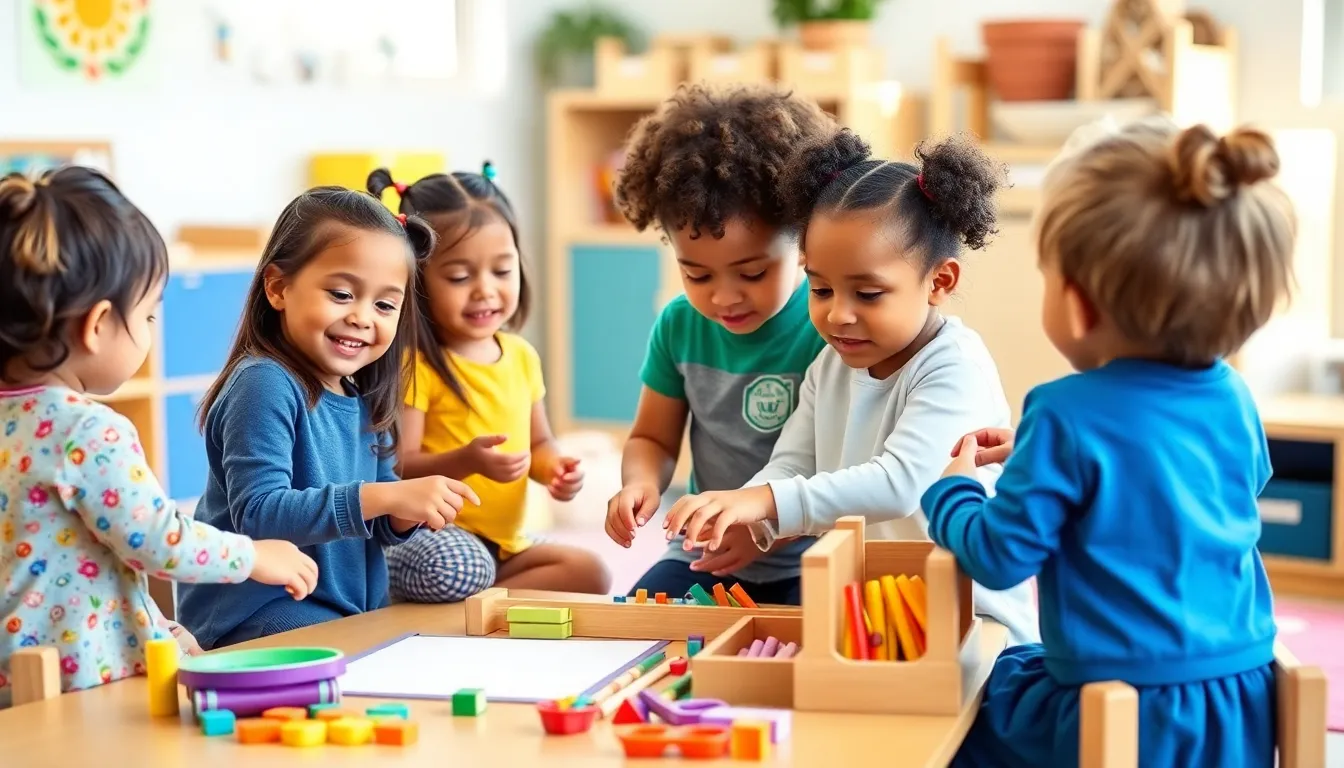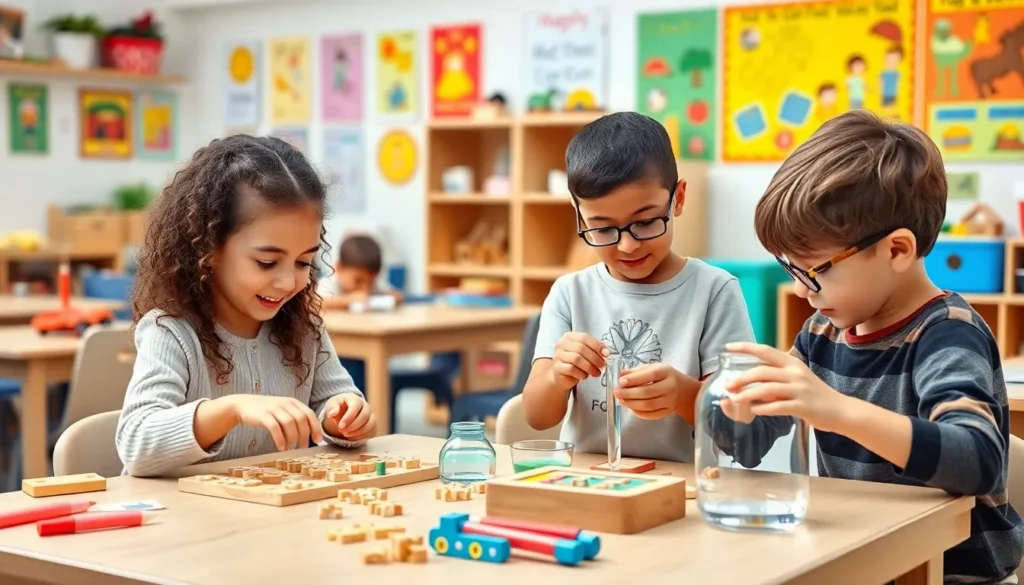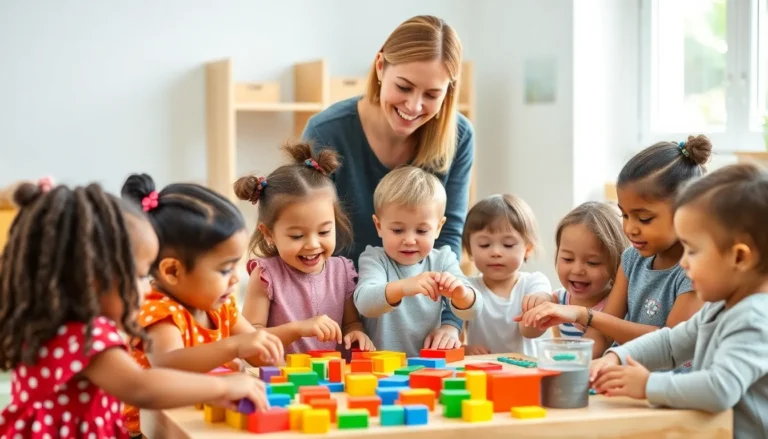Table of Contents
ToggleImagine a classroom where kids aren’t just sitting at desks, but exploring a world of learning at their own pace. Welcome to the vibrant universe of Montessori academic programs, where curiosity reigns supreme and traditional education takes a backseat. These innovative programs encourage children to become active participants in their learning journey, turning textbooks into treasure maps and lessons into adventures.
Overview Of Montessori Academic Programs
Montessori academic programs emphasize child-centered education. Learning environments promote independence and foster creativity. Students explore subjects through hands-on experiences rather than rote memorization.
Curriculum design reflects a holistic approach. Children engage with materials and activities that align with their interests. Individual learning paths allow for varied paces, enabling deeper understanding.
Teachers serve as guides, nurturing students’ natural curiosity. They observe and assess progress while facilitating exploration. Rather than standard lectures, educators create rich, interactive experiences that ignite passion for learning.
Classes typically mix age groups, promoting collaboration and social skills. Younger students benefit from observing their older peers. Older students reinforce their knowledge by mentoring younger classmates, creating a supportive community.
Montessori materials play a significant role in the learning process. These specially designed tools support abstract concepts and practical skills. Students manipulate physical objects, which enhances cognitive development through sensory experiences.
Assessment within Montessori programs differs from traditional measures. Instead of grades, educators use observations and portfolios to monitor growth. This continuous feedback supports personalized learning experiences.
Overall, Montessori academic programs cultivate a love for learning. Students develop critical thinking skills, autonomy, and resilience. Engaging with a diverse curriculum prepares them for future academic pursuits and real-world challenges.
Key Principles Of Montessori Education

Montessori education is built around several key principles guiding its unique approach. These elements foster an engaging and effective learning environment.
Child-Centered Learning
Child-centered learning remains a core component of Montessori education. In this model, children drive their own learning experiences. They choose activities based on personal interests, allowing exploration of subjects at their own pace. Teachers play the role of facilitators, guiding students as they navigate their learning journeys. This approach fosters independence, as students make decisions about their education. Collaboration among peers enhances social skills, with younger children learning from older ones and vice versa. This reciprocal teaching deepens understanding and reinforces knowledge retention.
Hands-On Learning Materials
Hands-on learning materials serve as essential tools in the Montessori classroom. These materials engage children actively, bridging the gap between abstract concepts and tangible understanding. Montessori resources, such as manipulatives and sensory tools, encourage exploration through physical interaction. They support various learning styles, catering to kinesthetic learners, visual learners, and auditory learners alike. Concrete examples aid in grasping complex ideas, fostering critical thinking and problem-solving skills. The intentional design of these materials invites curiosity, making learning a joyous and dynamic experience while promoting mastery of subjects.
Benefits Of Montessori Academic Programs
Montessori academic programs offer numerous advantages. They nurture children’s growth across various dimensions.
Development Of Independence
Independence is a fundamental goal in Montessori education. Children choose their activities, promoting decision-making skills. Engaging with materials fosters self-reliance. As a result, they build confidence in their abilities. Practical life activities, like pouring or buttoning, teach everyday skills. These experiences enhance motor coordination and responsibility. Inquiry-based learning allows students to explore at their own pace, creating a strong sense of autonomy. Children learn to assess their own progress through self-reflection, accelerating their personal development. Fostering independence prepares them for lifelong learning situations.
Fostering Social Skills
Social skills thrive in Montessori classrooms. Mixed-age groups encourage collaboration and communication. Younger children observe and learn from older peers. This interaction fosters mentorship opportunities, enhancing leadership qualities. Respect and empathy are integral components of the Montessori approach. Children learn to work together on group projects, developing teamwork skills. Engaging in conversations helps refine effective communication techniques. Participating in community activities promotes a sense of belonging. Overall, Montessori programs lay a solid foundation for nurturing social competence, preparing students for future relationships.
Curriculum Structure In Montessori Programs
Montessori programs feature a distinct curriculum structure that prioritizes developmental needs. The approach emphasizes holistic growth, integrating various subjects into a cohesive learning experience.
Age-Grouped Classrooms
Age-grouped classrooms create an environment tailored to developmental stages. Children typically range from three to six years within one classroom. This grouping allows for flexibility in learning, as children progress through activities at their own pace. Younger students benefit by observing older peers’ skills, while older ones reinforce knowledge by teaching. Teachers guide the learning experiences, ensuring every child’s needs are met without standardizing progress.
Mixed-Age Learning
Mixed-age learning fosters collaboration and enhances social dynamics. Students interact across ages, promoting mentorship opportunities. Older children often assist younger ones, building leadership skills and reinforcing their understanding. This setup encourages empathy and respect among peers, as children learn from one another’s strengths. The diverse age range in classrooms cultivates a strong sense of community, enriching the learning atmosphere.
Montessori academic programs offer a transformative approach to education that nurtures children’s innate curiosity and independence. By fostering a collaborative and engaging learning environment, these programs empower students to take charge of their educational journeys. The emphasis on hands-on experiences and mixed-age classrooms cultivates essential social skills while encouraging critical thinking and problem-solving abilities.
As children explore subjects at their own pace, they develop a lifelong love for learning that extends beyond the classroom. Montessori education not only prepares students for future academic challenges but also equips them with the skills necessary to thrive in an ever-changing world. Embracing the principles of Montessori can lead to a more enriching and fulfilling educational experience for children.





